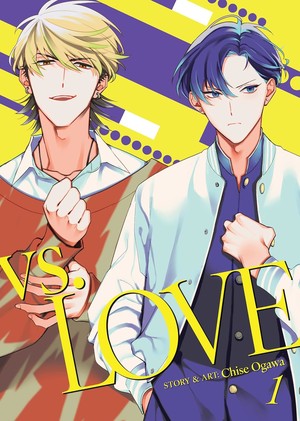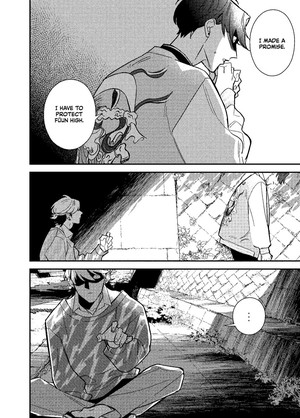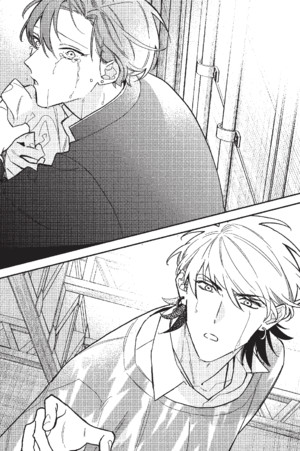The Spring 2025 Manga Guide
vs. LOVE
What's It About?

Fūun High and Raiden High are two rival schools locked in an intense turf war, led by their top students, Ibuki Marin and Tsuzumi Nikoru. But one day, away from the rivalry and fighting, the two gang leaders meet. Unaware they're enemies, a love begins to blossom between them. Though they're destined to be enemies, will these star-crossed lovers come together... or is this story destined to be a tragedy?
A BL take on Romeo and Juliet set against the backdrop of a colorful cast of delinquents and their youthful struggles!
Vs. Love has a story and art by Chise Ogawa, with English translation by Caroline Winzenried. This volume is lettered by Nicole Roderick. Published by Seven Seas Entertainment (April 1, 2025). Rated 15+.
Is It Worth Reading?
Dee
Rating:

”When you're at Fūun you're at Fūun all the way / From your first beef rice bowl to graduation day…”
Okay, obligatory West Side Story reference out of the way, Vs. Love doesn't draw a ton of specific plot points from any Romeo & Juliet variant beyond the basic structure of “two people from warring factions fall in love.” Where it feels most Shakespearean is its love for dramatic irony, because Ibuki and Tsuzumi somehow have no idea they're smooching their sworn enemy.
The premise is deeply silly in a world of smartphones and social media, but mangaka Chise Ogawa tells the story with such confidence that it's easy to get swept up in the high school turf war and just roll with the (literal) punches. There's a paradoxically graceful sloppiness to her line art that makes everything feel just a little ungrounded, allowing it to exist in a heightened, not-quite-real world of teen factions and thunderstorm trauma. At the same time, she knows how to stage a dramatic beat, using lighting and angles to tense effect.
The series does touch on more serious issues—mostly regarding the pressure Ibuki faces as the Fūun faction's leader, as well as his difficulty expressing emotion—but the overall tone is breezier, more battle manga than character drama. This often works in its favor, because as a friendship story about Ibuki and his childhood pals fighting to save their school, Vs. Love is a lot of fun. The gang riff off each other well, providing both touches of levity and an emotional bedrock for the action. They care about each other and their school, so we should, too.
I'm less convinced by the central romance. Ibuki and Tsuzumi always seem to meet when Ibuki is most vulnerable—and because Tsuzumi immediately starts hitting on him, the relationship ends up feeling unbalanced and like Tsuzumi is (unintentionally) taking advantage of Ibuki's instability. Their romance is built on brief, emotionally and sexually charged meetings with very little conversation. I know that kind of explosive attraction works for some readers, and power to you. But at this point, it's hard for me to believe these near-strangers are going to be the love story that heals the town. Fortunately(?), Ibuki and Tzusumi don't spend that much time together, so their relationship had relatively little impact on my enjoyment. The dramatic irony is delicious, the high school rivalry escalates excitingly, and the end of the volume teases a shocking betrayal that made me want to bust out a popcorn bucket. Even if the romance didn't work for me, Vs. Love is still the kind of melodrama I'd enjoy seeing play out to the end.
Lauren Orsini
Rating:

I really should have taken notes while I was reading Vs. Love. The short summary is simple: it's Romeo and Juliet if they were two gang leaders in small town Japan. But delve a little deeper, and this story has a lot of different moving parts. Each romantic lead has at least three other lieutenants by his side, and they're all involved in a competition that's more complicated than just beating each other up. It was hard to tell who was and wasn't a main character. What's more, the story's hero does a complete 180 every time he encounters the opposite lead, transforming from his high school's toughest brute to a teary-eyed damsel in distress.
Ever since he can remember, hero Ibuki has been part of a turf war that has engulfed his whole town. What it's about no longer matters to these teen delinquents, just winning territory skirmishes and proving the comparable toughness of their high school over the rival high school. But this rural town isn't getting any bigger, and the balance of power is suddenly upset by the decision to consolidate both high schools into one. Which high school's building will remain? You'd think it'd be a municipal decision, but in the manga these teen delinquents are working out among themselves which of the two high schools will be left standing. Usually Ibuki's ridiculously-coiffed gang turns to him to lead them to victory. But Ibuki has a weakness only his top lieutenants know about: thunderstorms. When the rumble of thunder turns him into a teary mess, a handsome stranger named Tsuzumi offers him shelter from the storm. Throughout the volume, the reader is left wondering when this pair of lovers will finally be made aware that they're rival gang leaders. I get what the story is going for, but I didn't find it particularly suspenseful to wait for the other shoe to drop.
The strength of this story is the way Ibuki and Tsuzumi can be themselves around each other, rather than the tough guys their gangs pressure them to be. But their secret rendezvouses are few and far between the complicated, low stakes politics of their high school rivalry. This rivalry is pointless in its heavy handedness, including actual crimes like kidnapping. This is probably one of those manga that takes a few volumes to really get going, but I'm not going to read the second book to find out.
discuss this in the forum (28 posts) |
back to The Spring 2025 Manga Guide
Seasonal homepage / archives